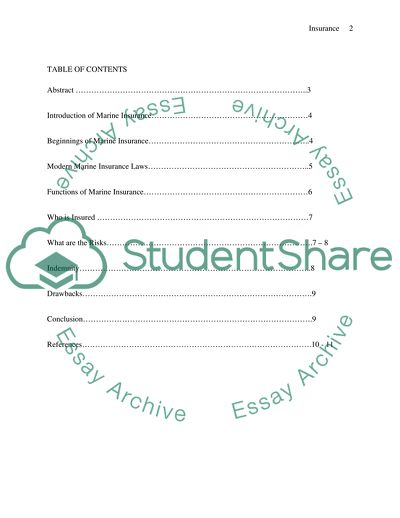Cite this document
(Marine Insurance Essay Example | Topics and Well Written Essays - 1500 words - 2, n.d.)
Marine Insurance Essay Example | Topics and Well Written Essays - 1500 words - 2. https://studentshare.org/law/1768609-the-main-function-of-marine-insurance-is-to-compansate-the-insured-for-loss-or-damage-caused-by-the-risk-insured-against-in-many-case-the-compensation-by-the-insurers-takes-the-form-of-indemnity-what-do-you-understand
Marine Insurance Essay Example | Topics and Well Written Essays - 1500 words - 2. https://studentshare.org/law/1768609-the-main-function-of-marine-insurance-is-to-compansate-the-insured-for-loss-or-damage-caused-by-the-risk-insured-against-in-many-case-the-compensation-by-the-insurers-takes-the-form-of-indemnity-what-do-you-understand
(Marine Insurance Essay Example | Topics and Well Written Essays - 1500 Words - 2)
Marine Insurance Essay Example | Topics and Well Written Essays - 1500 Words - 2. https://studentshare.org/law/1768609-the-main-function-of-marine-insurance-is-to-compansate-the-insured-for-loss-or-damage-caused-by-the-risk-insured-against-in-many-case-the-compensation-by-the-insurers-takes-the-form-of-indemnity-what-do-you-understand.
Marine Insurance Essay Example | Topics and Well Written Essays - 1500 Words - 2. https://studentshare.org/law/1768609-the-main-function-of-marine-insurance-is-to-compansate-the-insured-for-loss-or-damage-caused-by-the-risk-insured-against-in-many-case-the-compensation-by-the-insurers-takes-the-form-of-indemnity-what-do-you-understand.
“Marine Insurance Essay Example | Topics and Well Written Essays - 1500 Words - 2”. https://studentshare.org/law/1768609-the-main-function-of-marine-insurance-is-to-compansate-the-insured-for-loss-or-damage-caused-by-the-risk-insured-against-in-many-case-the-compensation-by-the-insurers-takes-the-form-of-indemnity-what-do-you-understand.


